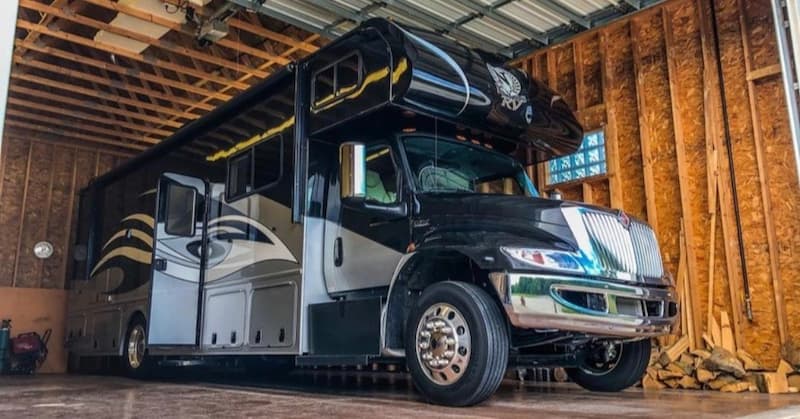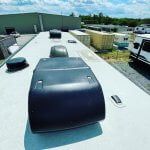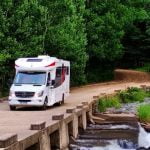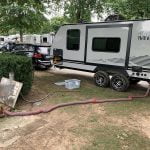
Your recreational vehicle (RV) might be your pride and joy. However, it also takes up a lot of space, and it can be hard to store when you’re not using it.
Luckily, many self-storage facilities have the space and amenities to help you store your RV safely when not in use and without breaking the bank.
Here are some factors to consider when choosing the right storage facility for your RV.
What Should I Consider Before Making My Final Decision?
Finding secure storage can be challenging. Self-storage facilities offer safe indoor storage and are a great option for RVs. So, how do you choose one?
Make sure you research your options before making your final decision. Be sure to ask questions like: Is this a climate-controlled storage area? Will it be easy to access my vehicle here?
Is there on-site security? And if possible, visit some of these facilities before making your final decision.
Storing Your RV – What Are Your Options?
When choosing an indoor storage facility for your RV, it’s essential to consider how you plan to use your vehicle in the future.
If you live somewhere with extreme climates and only plan on using your vehicle occasionally, it might be best to opt for indoor storage.
On the other hand, if you live in a warm area and plan on using your vehicle regularly, outdoor storage might be more appropriate.
Many RV owners also choose to store their vehicles in self-storage while they travel—this is a great option for those who want to rent out their home while away or intend to make travelling cheaper by not paying high hotel fees.
There are even some self-storage facilities that offer covered RV parking options. This will protect your vehicle from both sun and rain damage.
What if I want to store my RV indoors?
If you prefer to store your RV indoors, there are many storage options.
Many self-storage facilities offer climate control, which will help keep your vehicle safe and secure throughout the cold winter and hot summer months.
If you plan on storing an RV inside a self-storage facility, make sure it’s out of direct sunlight.
Direct sunlight can cause damage to paint and other parts of the RV over time.
You may also consider purchasing an RV cover for added protection during storage.
In addition, when choosing a storage unit for your motorhome or camper trailer, you should consider:
What size storage unit do I need?: Before heading to a self-storage facility with your motorhome or camper trailer in tow, you need to know how much space you need.
FIND THE RIGHT RV STORAGE SOLUTION FOR YOU
Here are a few RV storage tips:
Safety: Security should be your top priority when choosing a storage space for your RV.
The safest storage spaces will have the following features gated access, 24-hour surveillance, an on-site manager, and monitored alarms.
It’s also essential to ensure proper ventilation in your storage space—most RVs produce water vapor from their generators or from being parked outside—and if left unchecked, it could cause damage to other items stored nearby.
Location: Choose a storage facility near where you live or work so that you can easily visit your RV whenever necessary.
You may even want to consider one close to multiple locations so that you can store your RV at more than one place while travelling or on vacation.
Price: Consider how much storage space you need and how often you plan on accessing your vehicle during storage before deciding how much storage space to rent.
Finally, remember that price isn’t everything!
What Are Some Tips to Remember When Storing an RV?
When planning to store an RV, some important factors to consider.
Your number one priority should be to purchase a quality RV cover for your RV, and you must ensure it is custom-fit and well-sealed to keep out dust, water, bugs and debris that can damage your vehicle over time.
Then, thoroughly clean your RV inside and out before storing it.
Having a detailed checklist will ensure you haven’t missed anything important.
Finally, park your RV in a garage or under shelter to avoid getting damaged by weather or wildlife.
Why Choose Storing Your RV at Home?
Storing your RV at home is a convenient option to save you money and keep your vehicle safe. If you’re not going to be using your RV for a long period, it makes sense to store it at home.
Instead of paying hundreds of dollars a month in storage fees, you’ll only have to pay for gas and routine maintenance.
You’ll also free up valuable space in your garage or driveway, which means more room for other things.
How much does it cost to store an RV?
RV storage cost depends on a few factors:
- What sort of storage unit do you need.
- Whether you prefer indoor or outdoor storage.
- How long do you need to store your vehicle?
Many self-storage facilities offer differently sized units with corresponding indoor and outdoor storage prices.
These rates can change based on location, but in general, it’s best to call around for prices before deciding on a facility. Find out if additional fees or taxes are associated with your rental agreement.
You might also want to ask about special promotions; some companies may be willing to give you a discount when renting long term.
For example, one company might charge $90 per month for short-term rentals (less than one month) while another charges $75 per month for rentals lasting for three months or more.
If you don’t plan on keeping your RV stored for a very long, compare monthly costs between various companies to save you from unnecessary spending.
How do you store an RV outside?
First, you need to ensure that your RV is empty of belongings before taking it to a storage facility.
Leaving anything inside your RV will increase your chances of being broken into and potentially attract vermin and pests.
You can purchase a locked storage space at many facilities to store an RV outside. These spaces offer protection from theft and weather damage.
Although these spaces are inexpensive, they aren’t cheap enough to prevent theft entirely; always take measures to keep your belongings safe!
How do you store an RV in your garage?
If you don’t have a lot of extra room in your home or yard, consider storing your RV in your garage instead.
When storing an RV in a garage, the most important thing is to protect it from water damage. You should use plenty of drywall or cardboard on all sides, with some tarp covering and lock up your vehicle, especially if you live in a high-crime area.
Where can I find RV storage unit near me?
Most cities have self-storage facilities for RVs, and as long as there’s not too much snow where you live, any large parking lot or warehouse should suffice for keeping your vehicle protected from theft and inclement weather.
Conclusion:
If you are an owner of class a, class b, class c, Trailer, or Camper and want to keep your recreational vehicle in top shape, choosing a storage unit that offers the best adequate protection is important.
Every self-storage facility is different, so it’s best to look into as many options as possible before making a final decision.



